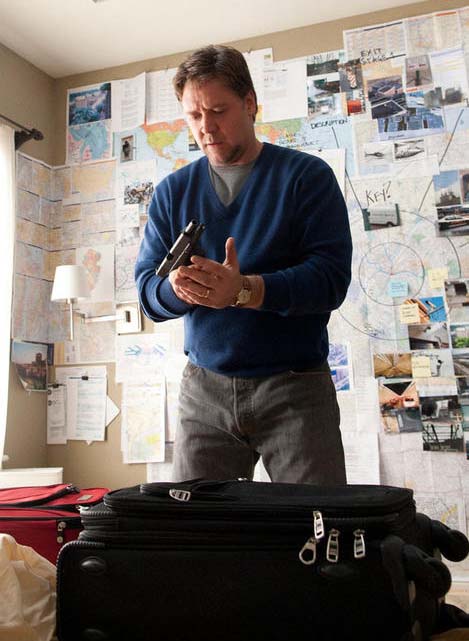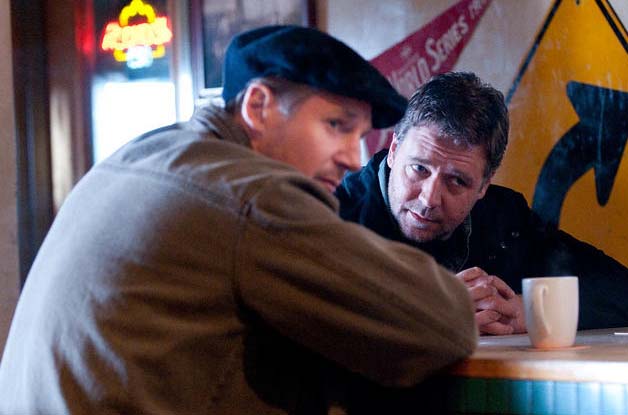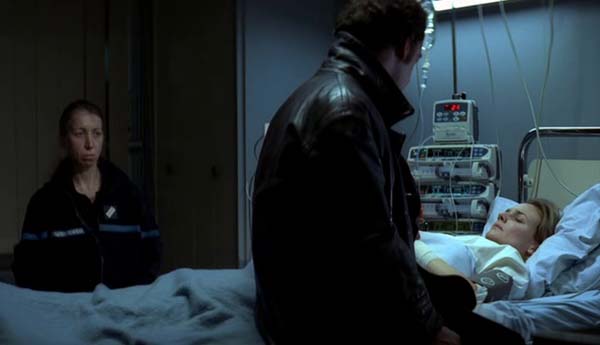A Paul Haggis movie inevitably makes you feel like a well-trained parrot who has recently learned to squawk, “Hey hey, ho ho, intolerance has got to go!” Instead of the stale cracker offered as reward, one is asked to sit dutifully through the end credits.
In attempting to understand Paul Haggis’s position in the film world, I’m considering the time-honored Monet chestnut: “People discuss my art and pretend to understand as if it were necessary to understand, when it’s simply necessary to love.” But Paul Haggis’s movies — all containing lack of logic, stock archetypes, and soupy storylines — are altogether too easy to understand. These movies are about as challenging as inking in a TV Guide crossword puzzle. But even the best stupid movies give us very good reasons to love them. By contrast, when The Next Three Days features an early moment (not in Pour Elle, the template for Haggis’s remake) with privileged scum making reductionist statements about gender to prove how “authentic” Haggis is in getting “real” people, it becomes almost effortless not to love it.
The Haggis apologists rebut with Casino Royale and Letters from Iwo Jima (and sometimes the overrated In the Valley of Elah) when presented with the perfectly reasonable observation that the Oscar-winning Crash, with its tawdry caricatures spouting racist sentiments like loutish anchormen reciting whatever is on the Teleprompter (instead of, say, communicating the origin point of a character’s deeply developed atavism through performance), was last decade’s answer to Guess Who’s Coming to Dinner. Haggis may very well be the Stanley Kramer of our time. Like Kramer, he is without subtlety. Like Kramer, his work will not date well. Like Kramer, he preaches to the converted. But there’s something more invidious about Haggis — something that goes beyond Kramer’s redolent earnestness — that I need to pinpoint here.
Casino Royale‘s “gritty” reboot was applied to a well-known and entirely fantastical archetype. Should Haggis really be commended for such ostensible authenticity? James Bond is enjoyable, but he is hardly a Doestoevsky character. (One can likewise make a similar claim about Christopher Nolan’s Batman films. Indeed, Jonathan Lethem did, writing in 2008 that he “couldn’t shake the sense that a morbid incoherence was the movie’s real takeaway, chaotic form its ultimate content.”) Letters from Iwo Jima is rightly considered to be a historical corrective to The Greatest Generation. But might not its cheap flips of the coin be similarly styled “morbid incoherence?” (It’s telling that screenwriter Iris Yamashita was able to interpret Haggis’s cornball situations in another language. American audiences, in turn, get these subtitles for lines that were adjusted from whatever vile banter Haggis brought to the table.) We see World War II from the Japanese side and we’re supposed to believe that the film is down with it because American soldiers incinerate the Japanese with a flamethrower. But what makes this narrative exercise any different from the old Twilight Zone episode, “A Quality of Mercy,” which uses the battleside switcheroo for the purposes of conceptual speculative fiction?
Haggis’s scripts are proud liberal exercises that make me profoundly ashamed to be a progressive. Real progressives don’t wave their fingers at their audience. They don’t bully people into enlightenment or self-awareness. Hell, good people of any political temperament don’t do this. They actually listen to people. They encourage. They plant clues. Accordingly, Haggis’s appropriation of genre tropes for movies that are condescending with their apparent “insight” into humanity makes me profoundly ashamed to be a moviegoer. It isn’t often that I’m so severely disappointed by a film. What the hell. I may as well go a few steps further and suggest that Paul Haggis has no business being declared a realist, a decent filmmaker, or even a worthy screenwriter. He’s using so many old inversion tricks that his films can never competently reflect the real world. When even the critics who like his movies — such as Moveiline‘s Stephanie Zacharek — feel compelled to point out that Haggis “doesn’t seem to know how to establish real couplehood closeness without equating it with hot, unfettered sex,” one detects an “artist” who is hardly curious about people and who is more interested in feeling superior when he sketches the kind of crude character doodles that would get him roundly bitchslapped at an MFA workshop or a bar. Or as Rolling Stone‘s Peter Travers succinctly noted, “It’s damn hard to enjoy a thriller when you don’t, won’t, can’t believe a word of it.”
 The Next Three Days is a remake of Pour Elle — a French film that did have a rather unbelievable storyline about a high school teacher trying to spring his wrongfully accused wife from jail. But Pour Elle managed to transcend its melodrama by imbuing its characters with passionate qualities, by making their struggles interesting to us. The Next Three Days is, rather curiously, without such vim and vigor. Pour Elle had the decency to give us carnal intensity from the get-go. With a few simple moments of visual lust established in the beginning, we could understand immediately why Julien Auclert (John Brennan in the remake) would do anything to rescue Lisa (Lara in the remake). But in the Haggis universe, John and Lara have to ask if their kid is asleep before opting to fuck each other blue. And this safe and hackneyed stance, calculated to appeal to unadventurous suburban audiences, is deeply offensive to me as an American. Because the ostensibly straitlaced are, let’s face it, more screwed up than they are willing to admit. But aside from this practical consideration, wouldn’t it be more interesting to have the Brennans screw each other ravenously with their kid awake? With their kid queasily aware at an early age (like many) of how intense his parents are fucking? How’s that for a family dynamic? If Haggis had the balls to play things out like this, then we’d have a far more interesting film. But that ain’t the way Haggis rolls. When it comes to sex, he’s nearly as virginal in his approach as Spielberg. One wonders if Haggis has ever had the guts to live a little on the wild side.
The Next Three Days is a remake of Pour Elle — a French film that did have a rather unbelievable storyline about a high school teacher trying to spring his wrongfully accused wife from jail. But Pour Elle managed to transcend its melodrama by imbuing its characters with passionate qualities, by making their struggles interesting to us. The Next Three Days is, rather curiously, without such vim and vigor. Pour Elle had the decency to give us carnal intensity from the get-go. With a few simple moments of visual lust established in the beginning, we could understand immediately why Julien Auclert (John Brennan in the remake) would do anything to rescue Lisa (Lara in the remake). But in the Haggis universe, John and Lara have to ask if their kid is asleep before opting to fuck each other blue. And this safe and hackneyed stance, calculated to appeal to unadventurous suburban audiences, is deeply offensive to me as an American. Because the ostensibly straitlaced are, let’s face it, more screwed up than they are willing to admit. But aside from this practical consideration, wouldn’t it be more interesting to have the Brennans screw each other ravenously with their kid awake? With their kid queasily aware at an early age (like many) of how intense his parents are fucking? How’s that for a family dynamic? If Haggis had the balls to play things out like this, then we’d have a far more interesting film. But that ain’t the way Haggis rolls. When it comes to sex, he’s nearly as virginal in his approach as Spielberg. One wonders if Haggis has ever had the guts to live a little on the wild side.
The Next Three Days is also too damn long. A good thirty minutes have been appended to Haggis’s adaption. But why? Pour Elle cut straight to the chase. After Lisa gets arrested, our next shot of her is in prison. Her son Oscar spurns his kisses when he comes to visit with Julien. Lisa asks about some girl from the parking lot. Julien informs his wife that a detective has been looking into this, but it’s been three years. This is near perfect narrative economy that permits us to fill in the gaps. Why would you want to mess with it?
Alas, Paul Haggis has. He’s adjusted a scene with an attorney (played in this remake by Daniel Stern; the attorney was a woman in the original), where John fires him when he reveals the insurmountable evidence against Lara. But in Pour Elle, Julien was more stoic. He is told by his attorney that he has to accept that his wife Lisa is in prison. And he walks away, without any tantrum. Now since we’ve seen Julien in wild lust with his wife earlier in the film, this makes us wonder if Julien’s energy is going to spill somewhere else. It provides a narrative tension that naturally connects with Pour Elle‘s cinematic momentum. But in the Haggis version, John is a passive guy prone to occasional outbursts that are more the result of convoluted plot advancement. In other words, where French writer-director Fred Cavaye was careful to alter his rhythm in relation to his characters, Haggis treats his characters more like automatons who must capitulate to a gilded template of Hollywood cliches.
For example, why would you meet with a man in a bar (played by Liam Neeson, who adopts one of the most unpersuasive Brooklyn dialects I’ve ever heard from an actor), one who has escaped from several prisons, while other people sit very close by, and ask him about his methods? In Pour Elle, Julien meets this guy at a racetrack, with the camera establishing a reasonable crowd buffer with which to safely discuss the verboten topic. Furthermore, Julien asks Pasquet, this prison escape expert, if he can tape the conversation. Pasquet replies, “No, it’s not valid evidence.” So we immediately understand that Pasquet is a seasoned expert and we know why he would meet in public like this. Furthermore, the setting, which involves people blowing money on the horses, is one in which some guy giving cash to another isn’t going to draw much attention. Not so with Haggis’s bar, in which the dissemination of cash is likely to be more flagrant. Julien also offers the pretext that he wishes to “teach” Pasquet’s book. There’s no pretext at all with Haggis’s John.
There is also something unpardonably stupid about a movie in which a man breaks into a truck delivering supplies to a prison and the parking lot, rather remarkably, doesn’t include a single security camera or a guard. John even snaps photos with his iPhone (uh, ever heard of GPS tracking?) of documents he’ll need to forge. But given how shaky the light can be on an iPhone camera, how can he be expected to nab a decent image to forge the documents? Furthermore, if you’re going to learn how to forge a document for a prison escape, why would you attend a community college class on Photoshop and draw attention to yourself? Wouldn’t you learn it on your own? When John learns how to make a bump key, he does so by consulting YouTube videos. Does this guy even clear his browser cache? Is Haggis even understand how Google tracks its users? Cutting a bump key isn’t a skill that Alton Brown can teach you overnight.
I haven’t even discussed The Next Three Days‘s laughable attempts at streetcred. To offer just one example, John asks around the Pittsburgh underworld, trying to obtain fake passports. When he finds his first prospect, the bar John enters is as harmless and boisterous as a sports bar. (By contrast, in Pour Elle, the bar that Julien enters was committed to a silent intensity, letting the audience fill in the blanks about the possible danger.)
But it isn’t just these basic behavioral issues that Haggis has failed to parse from the original. He also hasn’t learned how the little visual details made Pour Elle work. In the above still, we see a police officer giving Julien a dirty look (on the left half of the frame) in the hospital room when he visits his wife after a suicide attempt (the moment captured on the right half of the frame). This visual bifurcation establishes the two separate worlds that the law and Julien’s predicament are going to be operating in. It’s a nifty psychological nudge to the viewer. Yet we don’t get anything this sly from Haggis. Then again, Haggis is not a man known for his visual chops.
Because I’ve been so hard on Haggis, I’ll give the man some small credit for casting Lennie James as a detective. James has proven to be quite watchable in everything. But even the confident expertise he establishes with his presence is undermined by the shoddy material.
The bottom line is that The Next Three Days gives its actors very little to do (the dependable Elizabeth Banks, in particular, is woefully underserved) and tries the audience’s patience. I can highly recommend the French original, but I cannot in good conscience declare Paul Haggis to be anything close to an essential filmmaker for our times.



I realize you wrote this in November of last year, and I realize I’m late to the party (I’m always late to the party, but I’m new to your blog), but as someone who loathes Paul Hackis and his hacky, hacky writing, I had to comment because I think there’s a couple of things you may not be taking into consideration regarding Haggis’s… um… persistence, for lack of a better word. I don’t know where you live, but if you have spent more than year or two in LA, you might understand why Haggis not only won’t go away, but continues to be given money to write and make his incredibly bad movies.
Firstly, I think it’s important to note that not all suburban audiences are unadventurous… although Haggis and studio execs tend to believe so. It is this patronizing insistence that execs in Hollywood are far more dynamic, urban and urbane than movie-going audiences that engenders formulaic film, the long life of cliches, stereotypes, unoriginal plots and Paul Haggis. These people, and count Haggis among them, truly believe American movie-going audiences cannot grasp subtlety or intelligence in any aspect of storytelling and can only handle a grittier reality when it is sugar-coated with A-list stars, special effects and simplistic writing. Clearly, the only thing that made “District 9” a successful movie among American audiences–even suburban audiences!–is that it had aliens, a spaceship and some shit blew up, NOT that it was making any kind of social commentary or that the characters were well-drawn and the dialog was well-written.
Of course suburban audiences spend their movie ticket money on unadventurous film! If that’s all that reaches their local cineplex, they have no other choice. Let them eat cake, indeed.
Which brings me neatly back to Haggis. Haggis, as you keenly observed, does not write for the common man. Haggis writes for the rather segregated film executives in Hollywood, and he pleases them very much. When “Crash” came out, regular folks like me and my neighbor at the time–who observed that the film was like a MOW that came out 10 years too late–raised an eyebrow that subsequently disappeared into our hairlines the more awards that silly film garnered. However, during that time I was also working for film executives, and those very non-regular folks were pleasantly and mildly shocked into some level of introspection, and proudly crowed and crowed about it: “Look at me! I’m a latent racist, too!” and then felt better for becoming self-aware. (I honestly can’t believe sometimes self-awareness was not built in to the survival of the species. It’s truly remarkable some people make it to 30.)
Haggis is like the best kind of shrink for the upper echelon of Hollywood, who are gently guided to confront a soft realism that produces a hearty-enough ick-factor at themselves to believe they have achieved self-awareness… and who makes them lots of money. Mostly off of themselves, if you can figure out that Chinese puzzle. But there it is.
One of the things that I learned from my decade in Los Angeles is that screenwriting, for the Hollywood film product, is a service industry. And from that perspective, Haggis is everyone’s favorite waiter.